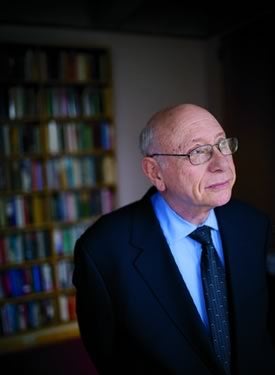For a young law student arriving at Harvard Law School in the fall of 1988, Morton Horwitz [’67] seemed to encapsulate everything that I (no doubt, naively) expected to see in a Harvard professor. Among the students, he was widely known as “Mort the Tort,” for the passion that he brought to the class with which he was most widely identified. I can still remember the intense discussions among my friends over lunch in Harkness Commons about the latest salvo from Morty that somehow seemed to connect tort law to important debates in philosophy, politics and economics. As a scholar, Morty was also associated with Critical Legal Studies, which was also the subject of many animated Hark conversations, although I must admit that few of us understood it very well. He was also the author of a book called “The Transformation of American Law,” which, one of my fellow students remarked in hushed tones, was “one of the most important books ever published in American legal history.”
What I did not know at the time was that behind the somewhat daunting figure of a Harvard professor was a person who had undergone many transformations of his own. A product of City College of New York, Morty had been in his first year of study at Harvard Law School when he faced an important decision. He had completed a Ph.D. in government at Harvard with Louis Hartz, and a prestigious university was now interested in giving him a tenure-track offer in that field. He was enjoying law so much, however, that he turned down the offer and never looked back. He finished HLS and eventually returned to the law school as a Charles Warren Fellow before joining the regular faculty in 1970. Here he wrote a series of articles and a Bancroft Prize-winning book that earned him the Charles Warren Professorship, while making common cause with like-minded professors to challenge the accepted contours of both teaching and scholarship at a school that still resembled the HLS portrayed in the book and the movie “The Paper Chase.” The interactions between Morty, Duncan Kennedy and Roberto Unger [LL.M. ’70 S.J.D. ’76] would soon coalesce into something called the CLS “movement”—a novel approach to legal scholarship that, in part because of Morty’s influence, continues to affect the writing of legal history more than any other field. He encountered resistance from more senior members of the faculty to his own brand of teaching—“ferociously Socratic,” he once described it to me—which nonetheless broke with what his older colleagues expected of a traditional HLS professor.
Much to my regret, then and now, I was not in Morty’s first-year Torts class. He was already 50 years old, but he still exuded his own brand of intellectual “coolness” that belied his age and made many of us wish we were in his section. I finally got a chance to take his American Legal History class in the winter term of 1990, along with 150 of my fellow students who packed into a large classroom in Austin Hall to hear Morty give a series of three-hour lectures that became the basis of the second volume of “Transformation.” Actually, they were less lectures than extended colloquies with the students. Their subjects ranged from Roscoe Pound, to the Frankfurt School, to the Warren Court, to Modernist art, and they made law come alive like no other class I had ever taken. There was also a popular undergraduate lecture class. More books and articles would follow for Morty; his history of the Warren Court, part of the Holmes Devise History of the Court series, is forthcoming.
My own desire to become a legal historian dated from the weeks that I sat in Morty’s legal history class that winter, and this past year I was fortunate enough to co-teach Morty’s last class at HLS on the History of American Economic Regulation. It is difficult to imagine him in retirement, and for me he will always remain at least partly the figure I met two decades ago, dazzling students with his signature phrases like “apologetic defenses of the status quo,” uttered in his unmistakable deep tenor voice, and making seemingly esoteric subjects like legal realism seem like things about which every educated lawyer should feel passionately.
